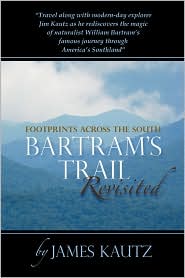 This morning I finished James Kautz' book Bartram's Trail Revisited. There has been a minor upsurge in interest in William Bartram in the last decade or so, and Kautz began working to retrace Bartram's trail in 2001, while living and teaching in the Atlanta area. My review is after the jump.
This morning I finished James Kautz' book Bartram's Trail Revisited. There has been a minor upsurge in interest in William Bartram in the last decade or so, and Kautz began working to retrace Bartram's trail in 2001, while living and teaching in the Atlanta area. My review is after the jump.Several works have been written about Bartram, about his travels (not least, of course, Bartrams Travels); about the flora and fauna he collected, identified, was the first European to see and name; and about the land over which he traveled. Kautz has taken a different view: this book is about what the land looks like now. He is not a fanatic follower of the exact path Bartram trod (indeed, the exact path is not known, what with GPS not being invented until 200 years later and all; very good estimations are made based on Bartram's accounts but in some places all we can do is get within 10 or 20 miles of the likely path), but instead visits the places Bartram wrote about, and looks to see what they are like today.
It's a very enjoyable read--though I'll admit if you aren't from the South or at least haven't lived here you probably won't be that interested--and spans all sorts of topics. Kautz gets into history and politics, he visits both natural places and developed ones, he discusses issues of race and class (which sadly still pervade the South at every level), he talks about fishing and canoeing, and about shopping and restaurants.
The book is not written chronologically; it is laid out in roughly the order in which Bartram traveled, but Kautz took his own trips where and when he could over the course of five years. Though certainly you'll learn some things about Bartram from this book, really, it's a look at the world Bartram visited, 230 years later. What would the man see if he took the trip today?
Kautz manages to avoid being too pro-environment here, and certainly he understands the need of people to have jobs and places to live and things to eat. He is no starry-eyed tree-hugger bemoaning the loss of the wilderness Bartram traversed. But neither is he blind to the devastation Americans have wrought on their landscape, both physically and culturally. Consequently the book is not depressing or sad, although it could be. Instead it's an enjoyable read, thought-provoking for any resident of the South, and a good introduction into the world of William Bartram. It's not the best book I've read this year (I think it will be tough to top Emergency Sex), but I can certainly recommend it.
No comments:
Post a Comment